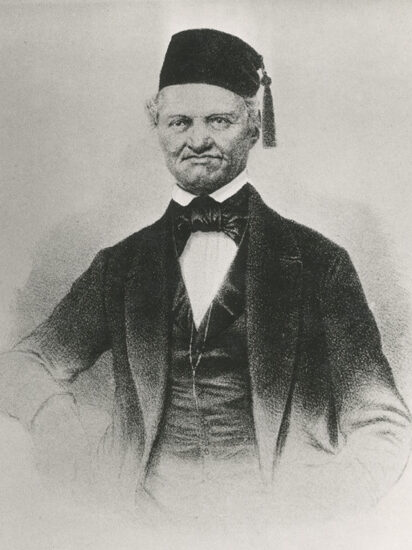May, Bernhard
May, Bernhard
Mill owner, politician, founder of the Free Religious Community
Born: 04.03.1783 in Guldental
died: 16.02.1856 in Biebrich
Bernhard May was born on a mill in the Guldenbach valley in the Hunsrück near Rheinböllen. Like his father, he also learned the trade of a miller and, after his apprenticeship, set off on a journey.
At the beginning of the 19th century, he became the tenant of the Kreckmanns or Erkelsmühle mill in Wiesbaden, which was located in front of the "Schwalbacher Tor", roughly where Emser Straße and Schwalbacher Straße meet today. In the meantime, he had married and was the father of a son.
In 1807, he went from being a tenant to the owner of a mill. On December 10, 1807, he acquired the Hammermühle in Salzbachtal and moved into the Hammermühle on January 1, 1808. He spared neither effort nor money to bring the entire facility up to the latest technical standards. He succeeded in producing a significantly lighter and better flour than all his competitors.
In addition to the milling business, Bernhard May had also set up a bread bakery. After the infantry barracks were built in Wiesbaden in 1819, he was entrusted with supplying bread for the garrison's military until the military administration set up its own bread bakeries (1880). His own sales outlet in Wiesbaden was set up in the so-called Häuserinsel opposite the ducal palace (now the town hall).
Over the years, his agricultural business became a model farm. Many farmers came to see him. Even King Leopold I of Belgium came to Biebrich twice to visit the Hammermühle, and Duke Adolf von Nassau appointed May to various commissions in the state because of his business knowledge.
However, May's interests went beyond his business activities. He was a supporter of the Liberal Party in Nassau and was regarded as a staunch campaigner for German unity. He took part in the Hambach Festival in May 1832. This visit had repercussions. When the Nassau military administration became aware of his participation, it briefly withdrew his permit to supply bread to the garrison. However, none of his competitors were able to fulfill May's obligations as correctly as he did.
May also played an important role in the revolutionary year of 1848 (1848 Revolution). When a large crowd had gathered in the square in front of the Wiesbaden City Palace on March 4, 1848 and the people were close to storming the palace, he was one of those who co-signed the declaration of the Minister Emil August Freiherr von Dungern, who approved the demands for freedom of the press, the right to vote and the arming of the people in the absence of the Duke.
After the duke had returned to Wiesbaden, May appeared with the duke on the balcony of the palace in order to virtually guarantee with his person that the duke would keep the promises he had made.
Many of the leading liberal politicians came to the Hammermühle in those years. Politically persecuted people who were wanted by the police for their liberal ideas often knocked on the gate at night. In those years, the Hammermühle became a "hostel of justice" because May, fearless and unconcerned about his property, welcomed all those who were persecuted. However, radical ideas were completely alien to him, and when liberal politics in Nassau began to take on increasingly extreme positions in his opinion, he withdrew from day-to-day political events.
But it was not only in political terms that May pursued a liberal path; he was also far removed from any dogmatism in the religious sphere. As a Catholic, he broke with his church when the first German-Catholic congregations were formed under the priest Johannes Ronge in 1845. He was also one of the founders of the Free Religious Community in Wiesbaden.
Bernhard May was a versatile man, always open to all sides, who enjoyed a great reputation in the Duchy of Nassau. He found his final resting place in the Biebrich cemetery on Hosenberg near his hammer mill. The city of Wiesbaden has named a street in Biebrich after him.
Literature
The Hammermühle near Biebrich on the Rhine with special consideration of its former owner Bernhard May, Biebrich 1905.
